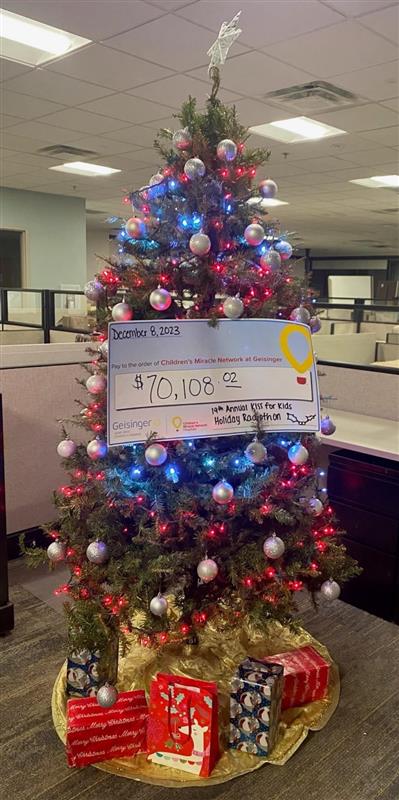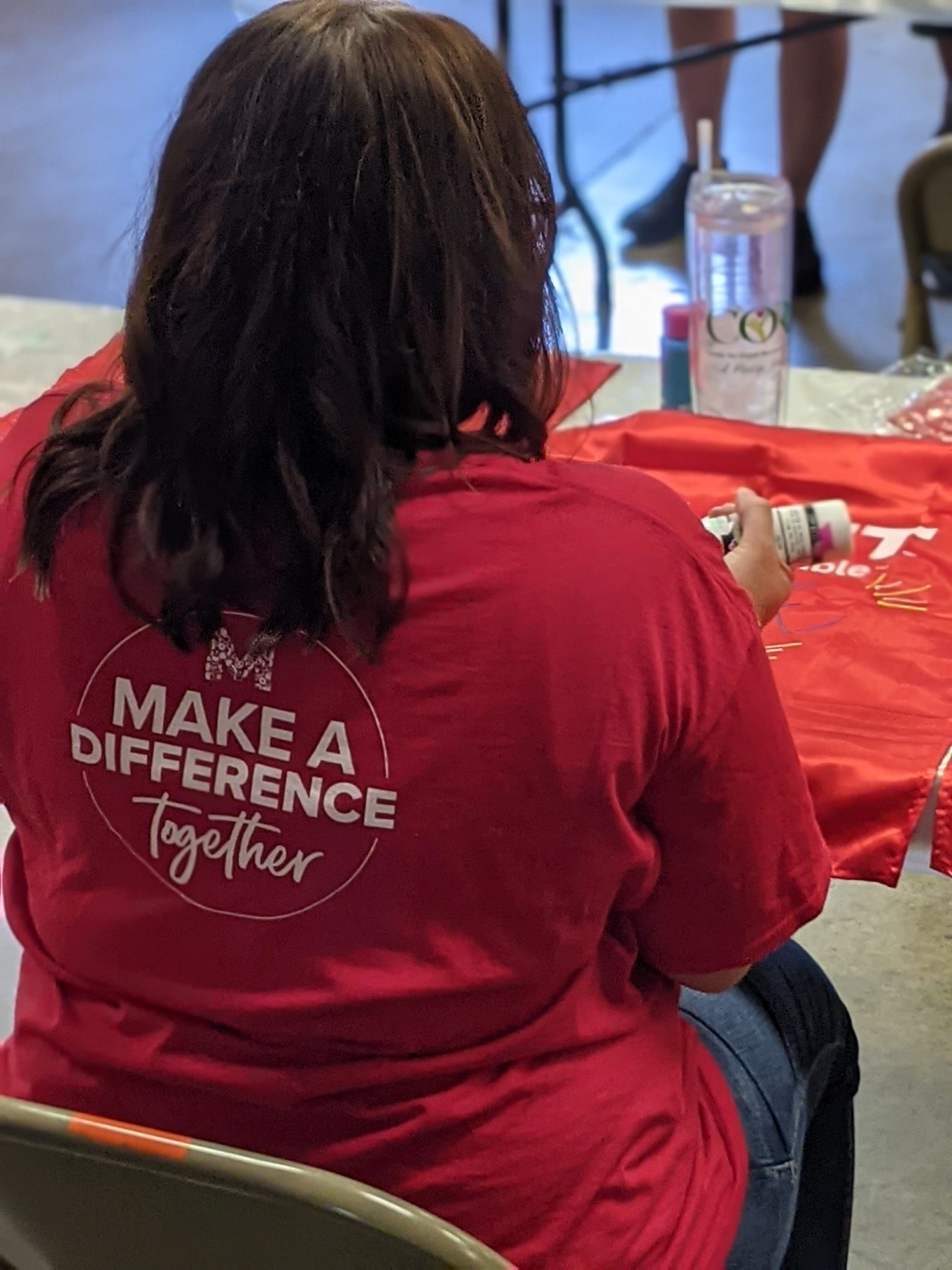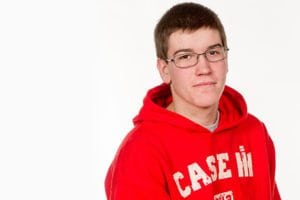2016 Miracle Kid Erik Sweppenheiser
Erik Sweppenheiser loves to work with his hands. The 17-year-old from Dallas, PA, works a part time job at a local gas station, changing oil, fixing tires and pumping gas. He also works at a local dairy farm, Hillside Farms, as part of a co-op program through school. And he volunteers for Kunkle Volunteer Fire Company in Dallas as a junior firefighter.
His hands-on demeanor is much needed in the Sweppenheiser home. In July 2013, Erik’s father Harry was involved in a car accident that left him paralyzed from the waist down. After the accident, Erik and his two brothers, A.J., 19, and Kyle, 13, needed to step up and help their father around the house.
“After my accident all three of the boys were and continue to be a big help,” Harry said. “Kyle and Erik really stepped up last year when AJ went to college at Susquehanna University.”
Working around the house for his dad has never been a problem for Erik, and if he isn’t doing something around the house, he can be found tinkering with his vehicle or other items.
“He is not a TV or video game person,” Harry said. “He would rather be outside ripping something apart and fixing it.”
In May 2014, though, Erik became very sick – and although he is handy, this was not something he could fix. While he was outside working in the yard, Erik started to feel ill. He went in the house to rest and his dad told him to take the next couple days off from school to get well.
On the second day, Harry returned from therapy and could tell something was wrong as soon as he entered the house.
“When I came home I could hear him sitting on the recliner, his breathing was really labored,” Harry said.
He called Erik’s grandmother to take Erik to the emergency room. By the time Harry and Erik’s mother Cynthia Bevan arrived at the local community hospital, doctors had determined that Erik had pneumonia in both of his lungs. They were waiting for a room to open to admit him. Finally, around 10 p.m., a room became available. Eric was on the pediatrics floor for less than 30 minutes when doctors realized his symptoms were worsening and he needed to be transported by Life Flight® to Geisinger Janet Weis Children’s Hospital in Danville.
Lisa Holtz, MD, a pediatric hospitalist, was on call at Geisinger Janet Weis Children’s Hospital when the local hospital called. They said they were transferring a child who was in severe distress and needed admission to the pediatric intensive care unit (PICU).
As soon as Erik arrived, the PICU staff could see that he was struggling to breathe. He was started on bilevel positive airway pressure therapy, which provides oxygen and air to help the patient breathe, but the machine was not enough for Erik.
“We could see in the first three to four hours that he was really struggling,” Dr. Holtz said.
As Dr. Holtz talked with Harry and Cynthia, she found out about Harry’s car accident. She also learned that he had had a methicillin-resistant staphylococcus aureus (MRSA) infection while he was in the hospital after the accident. A red flag went up.
“This alerted us that Erik was most likely dealing with a stronger form of pneumonia than we expected: MRSA pneumonia,” Dr. Holtz said.
The medical staff started very strong antibiotics to fight off the MRSA infection within the first hour of arriving to the pediatric intensive care unit however within the next 6 hours, Erik began showing effects of the infection. Eric was going into septic shock. The infection was affecting multiple parts of Eric’s body including his heart. He required multiple drugs to support his heart to maintain the needs of his body. Eric required blood products several times to counteract the effects of his infection. Those first hours we had several nurses, and medical staff at Eric’s bedside due to the complexity of his disease.
Because of the amount of help he needed to breathe, doctors decided to keep Erik sedated. This would keep him comfortable and help him heal.
“His lungs really took a beating from the infection. MRSA can basically eat at your lung cells and cause your lungs to become like Swiss cheese. Because of that you have difficulty opening up those lung cells and getting all the infection out,” Dr. Holtz said. “Because of the damage in his lungs, he was intubated with extreme pressures. It would be like driving down the road with your head out the window and your mouth open at 45 mph. It is very uncomfortable. We kept him sedated because of the pressure that was needed to open up those lung cells.”
In about 3 days, Erik overcame the septic shock, but he still had a long battle ahead to overcome the illness. Harry and Cynthia spent every minute they could by Erik’s side. Because of Erik’s infection, they were unable to stay at the Ronald McDonald House of Danville®, so they would come home in the evening and go back to the hospital in the morning. Harry would spend the week days at the hospital while Cynthia took the weekends and every minute she could be off work.
“The nurses, the doctors, everyone at Geisinger was phenomenal,” Harry said. “They took care of him, took care of us and kept us informed. Even if I was at home, they would call and update me with everything that was going on.”
After a few weeks, Erik was improving. But to take the next step, he needed to become more alert and begin eating. His medications were not only difficult to wean him from, but they also affected his digestion, causing him to have problems eating.
Dr. Holtz spoke to Erik’s mom and dad about giving Erik a tracheostomy, or trach – a hole cut surgically into Erik’s windpipe – to make him more comfortable and allow him to be more alert. His parents agreed, and the otolaryngology team placed a trach soon after.
“Erik recovered instantaneously after we put the trach in. He was a rock star,” Dr. Holtz said. “The transition time from the trach until he was able to move to pediatric rehabilitation was so short. It doesn’t usually happen that quickly for most kids.”
“Once they did the trach you could see the difference. He started to heal that much quicker,” Harry said.
After almost a month in the PICU, Erik was moved to HealthSouth in Danville for rehabilitation, where he worked on his balance and walking. Soon after, he returned home.
“He lost a lot of weight when he was in there. He was a big kid. He was my brute. He lost 30 pounds or more while in the hospital,” Harry said.
Dr. Holtz explained that kids are resilient compared to adults. If an adult would have gone through the same illness, they most likely wouldn’t have survived.
“He was very sick. The amount of resources and staff we needed to attend to Eric’s needs was unbelievable. He required blood products, medications to help his heart work effectively, ultrasounds of his heart, multiple medications to keep him sedated. The medical staff were at his bedside around the clock those first several days.”
“He was that close,” Harry said while holding up his fingers and showing less than an inch. “They told us, he was really close to not being with us any longer.”
For Dr. Holtz, the most amazing thing wasn’t just how Erik recovered or responded to treatment – it was the resilience that he and his family showed.
“His dad sat by his side for 18 hours straight and wouldn’t go to sleep,” she said. “It was so striking to see a father’s love for his child. He didn’t care about himself – he put himself second. His devotion to Erik was amazing.”
After returning home, Erik has been back to going to school, working and fixing things in his spare time.
“He is lucky to be with us,” Harry said.
Donations to Children’s Miracle Network at Geisinger provided the PICU with a bedside ultrasound machine used several times during Erik’s stay to place and assess the chest tubes placed in his chest. Gifts also purchased state-of-the-art echocardiogram equipment that tested Erik’s heart function and a glidoscope that was used to help intubate him while he was critically ill.






